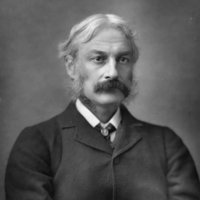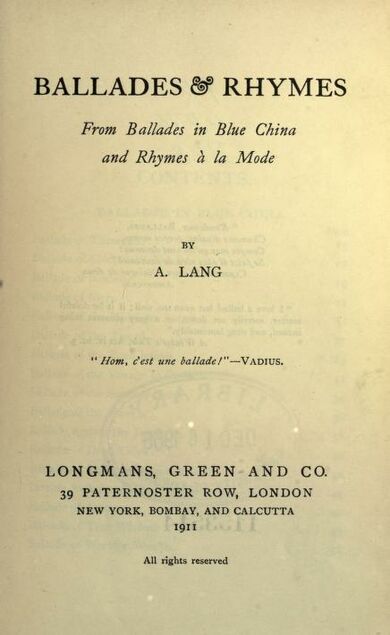The Barbarous Bird-Gods: A Savage Parabasis
In the Aves of Aristophanes, the Bird Chorus declare that they are older than the Gods, and greater benefactors of men. This idea recurs in almost all savage mythologies, and I have made the savage Bird-gods state their own case.
The Birds sing:
We would have you to wit, that on eggs though we sit, and are spiked on the spit, and are baked in the pan,
Birds are older by far than your ancestors are, and made love and made war ere the making of Man!
For when all things were dark, not a glimmer nor spark, and the world like a barque without rudder or sail
Floated on through the night, ’twas a Bird struck a light, ’twas a flash from the bright feather’d Tonatiu’s tail!
Then the Hawk with some dry wood flew up in the sky, and afar, safe and high, the Hawk lit Sun and Moon,
And the Birds of the air they rejoiced everywhere, and they recked not of care that should come on them soon.
For the Hawk, so they tell, was then known as Pundjel, and a-musing he fell at the close of the day;
Then he went on the quest, as we thought, of a nest, with some bark of the best, and a clawful of clay.
And with these did he frame two birds lacking a name, without feathers (his game was a puzzle to all);
Next around them he fluttered a-dancing, and muttered; and, lastly, he uttered a magical call:
Then the figures of clay, as they featherless lay, they leaped up, who but they, and embracing they fell,
And this was the baking of Man, and his making; but now he’s forsaking his Father, Pundjel!
Now these creatures of mire, they kept whining for fire, and to crown their desire who was found but the Wren?
To the high heaven he came, from the Sun stole he flame, and for this has a name in the memory of men!
And in India who for the Soma juice flew, and to men brought it through without falter or fail?
Why the Hawk ’twas again, and great Indra to men would appear, now and then, in the shape of a Quail,
While the Thlinkeet’s delight is the Bird of the Night, the beak and the bright ebon plumage of Yehl.
And who for man’s need brought the famed Suttung’s mead? why ’tis told in the creed of the Sagamen strong,
’Twas the Eagle god who brought the drink from the blue, and gave mortals the brew that’s the fountain of song.
Next, who gave men their laws? and what reason or cause the young brave overawes when in need of a squaw,
Till he thinks it a shame to wed one of his name, and his conduct you blame if he thus breaks the law?
For you still hold it wrong if a lubra belong to the self-same kobong that is Father of you,
To take her as a bride to your ebony side; nay, you give her a wide berth; quite right of you, too.
For her father, you know, is your father, the Crow, and no blessing but woe from the wedding would spring.
Well, these rules they were made in the wattle-gum shade, and were strictly obeyed, when the Crow was the King.
Thus on Earth’s little ball to the Birds you owe all, yet your gratitude’s small for the favours they’ve done,
And their feathers you pill, and you eat them at will, yes, you plunder and kill the bright birds one by one;
There’s a price on their head, and the Dodo is dead, and the Moa has fled from the sight of the sun!


